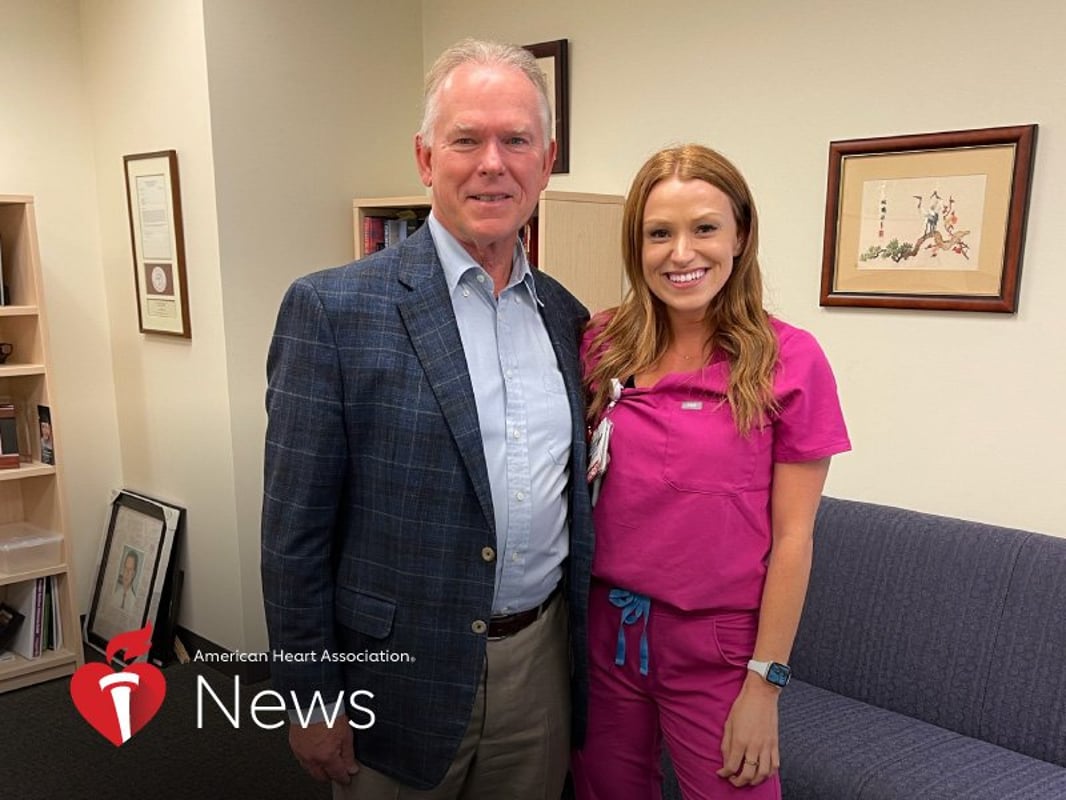AHA News: She Wanted to Thank the Surgeon Who Saved Her Life as a Baby. She Did – As His Colleague.

FRIDAY, May 5, 2023 (American Heart Association News) -- Hours after Sarah Hernandez was born in La Verne, California, doctors diagnosed problems with her heart – problems they couldn't fix. So they arranged for her to be flown to nearby Children's Hospital Los Angeles.
The trouble involved two valves in the newborn's heart. One valve was deformed and the other was overly narrow. Both congenital heart defects prevented proper blood flow. She needed open-heart surgery.
After 12 hours in the operating room, pediatric cardiac surgeon Dr. Vaughn Starnes told her parents that things went even better than expected.
Sarah grew up hardly thinking about her dramatic start to life. Annual checkups with a cardiologist were about the only reminder. Her parents were somewhat reluctant to allow her to play sports, but once they did, she jumped right in. Alongside soccer and tennis, she added a love of snowboarding and surfing.
Sarah also grew up with a younger brother, Manny Jr., who was born with several issues that required frequent medical attention. He was treated at CHLA, just as Sarah had been.
At the hospital, the family always used the same elevator. This meant always passing walls decorated with photographs of important events and people in the history of the hospital. One of the photos was a portrait of Starnes.
"This man saved your life," Sarah's mother, Shelley, would say to her, pointing to the image. "One day you will have to thank him."
By middle school, Sarah wanted to become a heart surgeon, just like Starnes. Then she saw how the nurses caring for Manny treated him and her family with so much care and respect. The nurses made everyone feel safe. One of them paid special attention to Sarah. Knowing that Sarah dreamed of working in medicine, the nurse gave Sarah a doll to demonstrate everything she would be doing for Manny.
Manny died at age 11. Sarah, then 15, changed her dream job. She wanted to become a nurse and help families like hers.
Starnes remained a touchstone in her life. For instance, when Sarah's track team set a record, her parents congratulated her, followed by, "You've come so far, thanks to Dr. Starnes." With every achievement, Starnes' role was always acknowledged.
In April 2020, Sarah graduated from college with a bachelor's in nursing and became a registered nurse. She landed a job at her most coveted place – the same hospital where she'd had her surgery. She took the post in January 2021. At the time, all new nursing graduates were doing COVID-19-related work, such as screenings and vaccinations. She was able to switch to the cardiac ICU a few months later.
While Sarah always remembered her vow to thank Starnes, she never had. She'd considered sending a letter, but it felt awkward, and she wasn't sure what to say.
In June 2021, she was working in a room that included two patients. As she treated one, a doctor entered to see the other patient. "I'm Dr. Starnes," he said, prompting Sarah to whip her head around.
After both finished with their patients, Sarah followed Starnes into the hall.
"Dr. Starnes, do you have a moment?" she asked, her voice trembling.
"Yes," he said. "What's up?"
"I just wanted to thank you so much," she said. "You were my heart surgeon almost 25 years ago. If it wasn't for you, I wouldn't be where I am today."
Starnes has performed about 9,000 surgeries during his 30 years at CHLA. He's met countless patients as teens and adults. Sarah was the first he met as his colleague.
This past spring, the hospital arranged for Sarah and Starnes to meet again and have a photograph taken to accompany a hospital article.
Sarah now works in the hospital's cardiovascular acute care unit. There, patients begin their recovery after complex surgeries while their families learn the intricacies of caring for a cardiovascular patient at home. That's exactly what her parents had to do when she was a baby.
"I love being able to take care of and treat people," Sarah said. "But even more, I love being able to teach their families and make them feel safe and comfortable taking their kids home."
Sarah shares her own story when it seems appropriate. It gives families hope.
For Sarah's family, the emotions run deep.
"I feel like everything came full circle," Shelley said. "First, Sarah was saved by Dr. Starnes. And now she's giving back."
American Heart Association News covers heart and brain health. Not all views expressed in this story reflect the official position of the American Heart Association. Copyright is owned or held by the American Heart Association, Inc., and all rights are reserved.
By Diane Daniel, American Heart Association News
Related Posts
Kraft Recalls Powdered Drinks Over Metal, Glass Concerns
THURSDAY, Nov. 24, 2021 (HealthDay News) -- Kraft Heinz Co. announced that it is...
